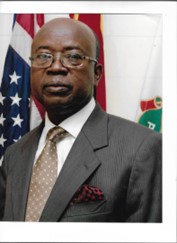By KINGSLEY LARBI( Rev. Prof.)
Chapter 10 of Born to Win is a compelling narrative that encapsulates the essence of resilience, determination, and the pursuit of education against the backdrop of rural and urban Ghana in the mid-20th century.
This chapter provides a vivid account of the author’s transition from a rural village to an urban middle school, offering readers a glimpse into the socio-cultural and educational landscape of the time. It is a story of how one boy’s determination and the support of his community led him on a path to success, despite the challenges he faced.
The Struggle for Education: A Walk of Destiny
The chapter opens with the author reflecting on the process of gaining admission into middle school, a significant milestone in his educational journey. At the time, transitioning from primary to middle school required passing a general entrance examination, which was often the gateway to further education and better opportunities.
For the young boy from a rural village, the closest middle schools were in Suhum, a town about sixteen kilometers away. The list of schools included Suhum Methodist Middle School, Ayekotse Local Authority Middle Boys School, New Town Middle School, Roman Catholic Middle School, and Suhum Girls’ School.
The narrative takes a critical turn when the author and his friends learn, almost too late, about the entrance exams. Undeterred by the lack of timely information from their village teachers, they decide to take their destinies into their own hands.
The decision to walk sixteen kilometers to Suhum to write the late entrance examination at the Methodist Middle School is portrayed as a pivotal moment in their lives. This journey, fraught with uncertainty, becomes a metaphor for the author’s determination to succeed against all odds.
Urban Life: A New World of Fascinations and Challenges
Upon gaining admission to the Methodist Middle School, the author relocates to Suhum, marking the beginning of a new chapter in his life. The move from a rural village to an urban setting introduces him to a world filled with new experiences and challenges. Staying with his maternal uncle, Mr. Bennet Owusu, the author finds himself in an environment that is both nurturing and demanding. Mr. Owusu, a generous and kind man, provides for the author and his cousin, ensuring that their basic needs are met.
The author’s first encounter with a cinema hall, located in a building attached to their house, becomes a symbol of the allure and distractions of urban life.
The presence of the cinema hall, a converted cocoa purchasing depot, captivates the young boy’s imagination. The nightly sounds of films streaming from the hall, referred to as “comedies,” are a source of fascination. However, this new environment also brings its own set of challenges, particularly the need to balance academic pursuits with the temptations of urban distractions.
Academic Triumphs and Social Integration
The author’s first term at the Methodist Middle School is marked by both academic success and social integration. Despite his initial apprehensions about competing in a reputable urban school, the author excels in his studies, much to the surprise of both himself and his peers. Topping his class in the terminal examinations is a moment of personal triumph, signaling his ability to succeed in an environment that was previously unfamiliar and daunting.
The chapter also highlights the author’s interactions with a diverse group of peers, including Nigerians and Muslims.
These interactions broaden his perspective and expose him to different religious practices, such as the use of a rosary, which he receives from a Roman Catholic organization in the USA. The friendships he forms, particularly with a Nigerian named Johnson Adesanya, play a crucial role in shaping his religious and social views.
The Role of Discipline and Community Support
Discipline and community support emerge as central themes in this chapter. The strict discipline imposed by the author’s uncle, who insists on academic focus and discourages time-wasting activities like crab hunting, is portrayed as crucial to the author’s success. This discipline is reinforced by the presence of school teachers in the house, who serve as role models and sources of encouragement.
The author’s eventual decision to move out of his uncle’s house and stay with Opanyin Kwadwo Darko, a transporter known for his generosity, introduces him to a different kind of communal living. Sharing a single room with several other boys, some of whom are much older and more experienced, teaches the author the value of communal spirit and hard work. The weekend trips to Opanyin Darko’s farm, where the boys work together and share meals from a single bowl, strengthen their bonds and instill in them a sense of collective responsibility.
Conclusion
Chapter 10 of Born to Win is a powerful testament to the resilience and determination required to navigate the challenges of education and urban life in mid-20th century Ghana. Through the lens of his personal experiences, Rev. Prof. E.K. Larbi offers readers an intimate portrayal of the struggles and triumphs that defined his early educational journey.
The chapter serves as an inspiring reminder that, despite the obstacles one may face, the pursuit of education and the support of a nurturing community can pave the way for success and personal growth.
The narrative is not just a reflection on the past, but also a lesson for future generations. It underscores the importance of seizing opportunities, embracing discipline, and relying on the support of one’s community to achieve one’s goals. In the end, the author’s journey from a rural village to an urban middle school is not just a walk of destiny—it is a walk of purpose, perseverance, and ultimately, victory.










